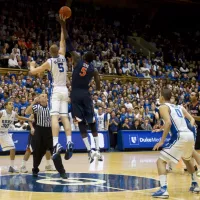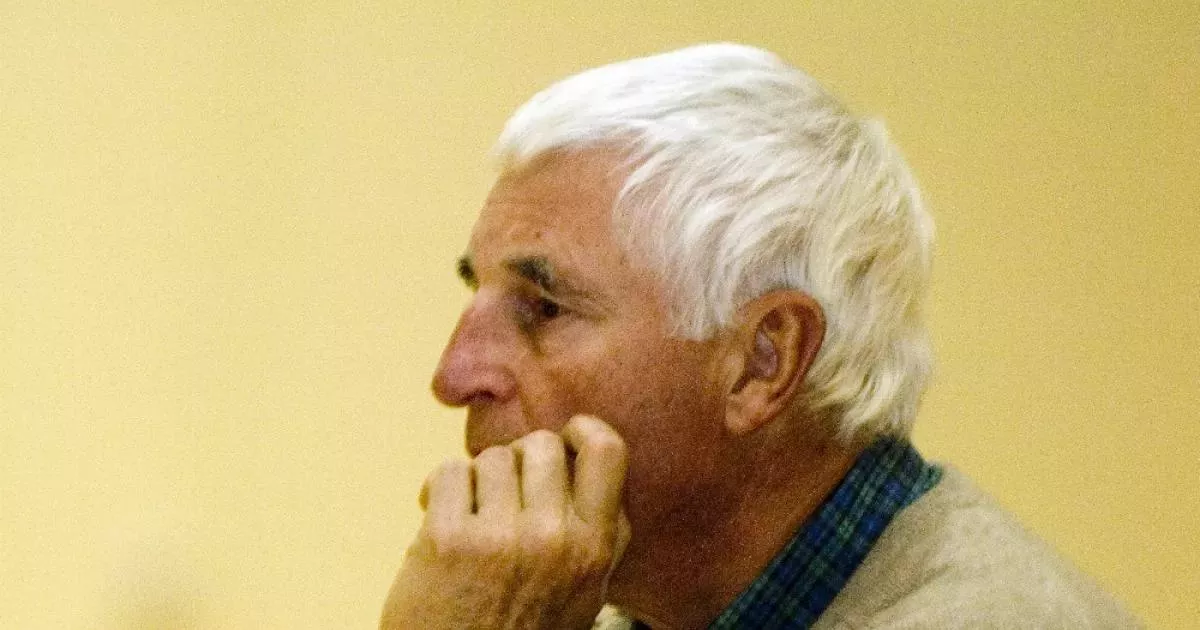Robert Montgomery "Bob" Knight, nicknamed "the General," was a highly successful and controversial American college basketball coach. He is best known for his tenure at Indiana University, where he won three national championships. Knight was renowned for his demanding coaching style, discipline, and strategic brilliance. He achieved 902 NCAA Division I men's basketball wins, a record when he retired and sixth all-time upon his death. Despite his coaching achievements, Knight's career was also marked by volatile behavior, including confrontations with players, officials, and the media.
October 25, 1940: Robert Montgomery Knight Born
On October 25, 1940, Robert Montgomery Knight, later known as Bob Knight, was born. He would become a prominent American men's college basketball coach.
1958: Knight Plays at Ohio State
In 1958, Knight began playing basketball at Ohio State under coach Fred Taylor.
1960: Olympic Gold Medalist
Douglas Blubaugh won a gold medal at the 1960 Olympics.
1960: Knight Wins NCAA Championship with Ohio State
In 1960, Knight, playing a reserve role, won the NCAA championship with the Ohio State Buckeyes.
1961: Buckeyes lose to Cincinnati in NCAA Final
In 1961, Knight and the Buckeyes lost in the NCAA finals to the Cincinnati Bearcats.
1961: Knight Plays in NCAA Championship
In the 1961 NCAA championship game, Knight came off the bench with 1:41 remaining, with Cincinnati leading Ohio State, 61–59.
1962: Knight Coaches Junior Varsity Basketball
After graduating from Ohio State University in 1962, Knight coached junior varsity basketball at Cuyahoga Falls High School in Ohio for one year.
1962: Buckeyes lose to Cincinnati in NCAA Final
In 1962, Knight and the Buckeyes again lost in the NCAA finals to the Cincinnati Bearcats.
1962: Knight Graduates from Ohio State
In 1962, Knight graduated from Ohio State with a degree in history and government.
April 17, 1963: Marriage to Nancy Falk
On April 17, 1963, Bob Knight married Nancy Falk, with whom he had two sons, Tim and Pat.
June 1963: Knight Enlists in U.S. Army
In June 1963, Knight enlisted in the U.S. Army and served on active duty.
September 1963: Knight Transferred to West Point
In September 1963, Knight was transferred to West Point, New York, after initial training at Fort Leonard Wood, Missouri.
1963: Knight Takes Assistant Coaching Position
In 1963, while in the army, Knight accepted an assistant coaching position with the Army Black Knights.
June 1965: Knight Joins U.S. Army Reserves
In June 1965, Knight transitioned from active duty to the U.S. Army Reserves.
1965: Knight Begins Coaching at Army
In 1965, Knight became the head coach of the Army Black Knights.
1966: Knight's Outburst at NIT
Following Army's loss to BYU in the 1966 NIT semifinals, Knight had an explosive outburst, kicking lockers and verbally blasting the officials. He later apologized to BYU coach Stan Watts.
April 3, 1968: Wisconsin Coaching Vacancy
On April 3, 1968, Knight was one of seven candidates vying to fill the Wisconsin men's basketball head coaching vacancy after John Erickson resigned to become the Milwaukee Bucks' first-ever general manager.
May 1969: Knight Ends Time in U.S. Army Reserves
In May 1969, Knight ended his time in the U.S. Army Reserves.
1971: Knight Becomes Head Coach of Indiana Hoosiers
In 1971, Knight became the head coach of the Indiana Hoosiers.
1972: Indiana Wins Big Ten Championship
In 1972, Knight's second year as coach, Indiana won the Big Ten championship.
1973: Big Ten Coach of the Year
In 1973, Bob Knight was named Big Ten Coach of the Year, marking the beginning of numerous Big Ten accolades.
1973: Blubaugh Becomes Head Coach at IU
In 1973, Douglas Blubaugh became head wrestling coach at IU.
1973: Hoosiers Lose to UCLA in Final Four
In 1973, Knight's Indiana team reached the Final Four but lost to UCLA.
December 7, 1974: Knight Hits Kentucky Coach
On December 7, 1974, during a game against Kentucky, Knight hit Kentucky coach Joe B. Hall in the back of the head while complaining to an official, leading to a confrontation.
1975: National Coach of the Year
In 1975, Bob Knight was unanimously selected as National Coach of the Year, marking a significant achievement in his coaching career.
1975: Hoosiers' Undefeated Regular Season Ends in Regional Loss
In 1975, despite an undefeated regular season, the Hoosiers lost to Kentucky in the Mideast Regional after Scott May's injury.
1975: Indiana Goes Undefeated
In 1975, the Indiana Hoosiers went undefeated during the regular season but lost in the NCAA Tournament.
1976: National Coach of the Year by the Associated Press
In 1976, Bob Knight was again honored as National Coach of the Year by the Associated Press, further solidifying his reputation.
1976: Knight Grabs Player
In 1976, Knight grabbed IU basketball player Jim Wisman and jerked him into his seat.
1976: Indiana Wins NCAA Championship Undefeated
In 1976, Knight's Indiana Hoosiers won the NCAA Tournament undefeated, the last Division I men's basketball team to achieve this.
1976: Indiana Wins National Title
In 1976, the Indiana Hoosiers, coached by Knight, won the NCAA title.
1978: Head Coach of US National Team
In 1978, Bob Knight was named the head coach of the United States men's national team for the 1979 Pan American Games.
1979: Indiana Wins NIT Championship
In 1979, Indiana, behind the play of Mike Woodson, won the NIT championship.
1979: Knight Wins Gold at Pan American Games
In 1979, Knight won a gold medal at the Pan American Games with the U.S. men's national team.
1979: Hoosiers Win Big Ten Championship
In 1979, the Hoosiers won the Big Ten championship.
1980: Big Ten Coach of the Year
Bob Knight was named Big Ten Coach of the Year in 1980, adding to his list of achievements.
1980: Hoosiers Advance to Sweet Sixteen
In 1980, the Hoosiers advanced to the Sweet Sixteen in the NCAA Tournament.
January 31, 1981: Alleged "Sucker Punch" in Indiana-Purdue Game
On January 31, 1981, in a game between Indiana and Purdue, Isiah Thomas allegedly hit Purdue guard Roosevelt Barnes, but video replay showed Barnes threw the first punch.
February 7, 1981: Knight's "Jackass" Incident
On February 7, 1981, Knight brought a "jackass" (male donkey) wearing a Purdue hat onto his television show as a representative of Purdue, after claiming derisive chants were directed at him, his wife, and Indiana University during a game at Purdue.
1981: Big Ten Coach of the Year
In 1981, Bob Knight received the Big Ten Coach of the Year award, acknowledging his ongoing success.
1981: Indiana Wins National Title
In 1981, Knight's Indiana Hoosiers won their second national title.
1981: Hoosiers Win NCAA Tournament
In 1981, led by Isiah Thomas, the Hoosiers won the NCAA Tournament.
1982: Hoosiers Ranked Number One
In 1982, the Hoosiers were ranked number one in the nation.
1983: Hoosiers Lose in Sweet Sixteen
In 1983, the Hoosiers, despite being ranked number one, lost to Kentucky in the Sweet Sixteen after an injury to Ted Kitchel.
April 1984: Olympic Tryout Camp
In April 1984, Knight held a 72-player tryout camp to select the 12-man roster for the U.S. national team at the 1984 Summer Olympic Games. The team included Michael Jordan, Patrick Ewing, Chris Mullin and Knight's Indiana player and protégé Steve Alford.
1984: Blubaugh's Time as Head Coach Concludes
In 1984, Douglas Blubaugh's time as head coach at IU concluded.
1984: Knight Wins Gold at Summer Olympics
In 1984, Knight won a gold medal at the Summer Olympics with the U.S. men's national team.
February 23, 1985: Knight Throws Chair Across Court
On February 23, 1985, during a Purdue–Indiana game, Knight threw a chair across the court after being assessed a technical foul, resulting in his ejection from the game.
1985: Divorce from Nancy Falk
In 1985, Bob Knight divorced his first wife, Nancy Falk.
1985: Allegations of Abuse Begin
In 1985, according to Todd Jadlow's book, Bob Knight allegedly began a pattern of physical abuse, including punching players and squeezing their testicles.
1985: A Season on the Brink Published
In 1985, the Hoosiers were profiled in the bestselling book "A Season on the Brink" by John Feinstein, who was granted unprecedented access to the Indiana basketball program.
1985: The 1985-86 Season of the Indiana Hoosiers
The 1985 season for Indiana Hoosiers was covered in the book "A Season on the Brink".
1986: Publication of A Season on the Brink
In 1986, John Feinstein published "A Season on the Brink", detailing the 1985-86 season of the Indiana Hoosiers and providing insights into Knight's life and coaching style.
1986: Three-Point Shot Adopted by NCAA
In 1986, the three-point shot was adopted by the NCAA. Although Knight opposed the rule change, it complemented his offense well by improving the spacing on the floor.
1986: Hoosiers Profiled in A Season on the Brink
In the 1985-86 season, the Hoosiers were profiled in the bestselling book "A Season on the Brink".
1987: Extradition Possibility and Apology
Following a United States Supreme Court ruling in 1987, Bob Knight, facing possible extradition to Puerto Rico over a past assault charge, wrote a letter to the Puerto Rico Olympic Committee apologizing for the incident.
1987: Naismith Coach of the Year Award
In 1987, Bob Knight became the first recipient of the Naismith Coach of the Year Award, a prestigious honor in basketball coaching.
1987: Indiana Wins National Championship
In 1987, led by Steve Alford, the Hoosiers won their third national championship against Syracuse, with a game-winning shot by Keith Smart.
April 1988: Controversial "Rape" Comment
In April 1988, Bob Knight made a controversial statement during an interview with Connie Chung, saying, "I think that if rape is inevitable, relax and enjoy it." The remark sparked outrage from women's groups across the nation.
1988: Marriage to Karen Vieth Edgar
In 1988, Bob Knight married his second wife, Karen Vieth Edgar, a former Oklahoma high school basketball coach.
1988: Hoosiers Win Big Ten Championship
In the 1988 season, led by Jay Edwards, the Hoosiers won a Big Ten championship.
1989: Allegations of Abuse Continue
According to Todd Jadlow's book, the alleged abuse by Bob Knight, which started in 1985, continued through 1989, including punching players and squeezing their testicles.
1989: National Coach of the Year Honors
In 1989, Bob Knight received National Coach of the Year honors from the AP, UPI, and the United States Basketball Writers Association, recognizing his coaching excellence.
1990: Publication of Hoosier Honor
In 1990, Robert P. Sulek wrote "Hoosier Honor: Bob Knight and Academic Success at Indiana University", which discusses the academic aspects of the basketball program under Knight.
1990: Publication of Playing for Knight: My Six Seasons with Bobby Knight
In 1990, Steve Alford, a former player under Knight, published "Playing for Knight: My Six Seasons with Bobby Knight", reflecting on his experiences.
1990: Hoosiers Dominate Big Ten
In 1990, the Indiana Hoosiers started a dominant run, posting 87 victories from 1990-91 through 1992-93, the most by any Big Ten team in a three-year span. They also captured two Big Ten crowns in 1990-91 and 1992-93.
1991: Pat Knight Played at Indiana
From 1991, Bob Knight's son Pat played basketball at Indiana, following in his father's footsteps.
1991: Induction into the Basketball Hall of Fame
In 1991, Bob Knight was inducted into the Basketball Hall of Fame, a testament to his significant impact on the sport.
1991: Knight Inducted into Hall of Fame
In 1991, Knight was inducted into the Naismith Memorial Basketball Hall of Fame.
1991: Big Ten Crown
In 1991, the Indiana Hoosiers captured a Big Ten crown. From 1990-91 through 1992-93, the Hoosiers posted 87 victories, the most by any Big Ten team in a three-year span.
1992: Big Ten Coach of the Year
Bob Knight was named Big Ten Coach of the Year again in 1992, recognizing his continued contributions.
1992: Reached Final Four
During the 1991-92 season, the Indiana Hoosiers reached the Final Four. From 1990-91 through 1992-93, the Hoosiers posted 87 victories, the most by any Big Ten team in a three-year span.
1992: Indiana Loses in Semifinals
In 1992, Knight's Indiana team lost in the NCAA tournament semifinals.
1993: Last Conference Championship
1993 marked Bob Knight's last conference championship. Knight continued to experience success with continual NCAA tournament appearances and a minimum of 19 wins each season throughout the mid and late 1990s.
1993: Big Ten Coach of the Year
In 1993, Bob Knight won the Big Ten Coach of the Year award, highlighting his consistent performance.
1994: Last Trip to Sweet Sixteen
1994 was Bob Knight's last trip to the Sweet Sixteen. Knight continued to experience success with continual NCAA tournament appearances and a minimum of 19 wins each season throughout the mid and late 1990s.
1994: Appearance in Blue Chips
In 1994, Bob Knight appeared in the feature film "Blue Chips," where he coached against a character modeled after himself.
1997: Neil Reed Choking Allegation
In 1997, former player Neil Reed claimed that Knight choked him during a practice.
March 14, 2000: CNN Airs Reed Choking Allegations
On March 14, 2000, the CNN Sports Illustrated network aired a piece on Robert Abbott's investigation of Knight. The story included former player Neil Reed's claim that Knight had choked him during a 1997 practice, which Knight denied.
September 2000: Firing of Bob Knight
In September 2000, Bob Knight was fired from Indiana University after an incident with freshman Kent Harvey and numerous other complaints. This led to student outrage and protests.
2000: Knight's Tenure Ends at Indiana
In 2000, Knight's tenure as the head coach of the Indiana Hoosiers concluded.
2000: Knight Fired from Indiana University
In the fall of 2000, Knight was fired by Indiana University following a run-in with a student, after the university had instated a "zero tolerance" policy for him.
2001: Donation to Texas Tech Library
In 2001, Bob Knight donated $10,000 to the Texas Tech library, and his wife donated $25,000, establishing the Coach Knight Library Fund.
2001: Knight Becomes Head Coach of Texas Tech
In 2001, Knight became the head coach of the Texas Tech Red Raiders.
2002: A Season on the Brink TV Adaptation
In 2002, ESPN's first feature-length film was "A Season on the Brink", a TV adaptation of John Feinstein's book, with Knight portrayed by Brian Dennehy.
August 2003: Induction in The Vince Lombardi Titletown Legends
In August 2003, Bob Knight was honored as the first inductee in The Vince Lombardi Titletown Legends.
2003: Cameo in Anger Management
In 2003, Bob Knight made a cameo appearance as himself in the film "Anger Management."
2003: Publication of Knight: My Story
In 2003, Knight's autobiography, "Knight: My Story", co-written with Bob Hammel, was published, offering insights into his life and career.
2005: Additional Donation to Texas Tech Library
In 2005, Bob Knight donated an additional $40,000 to the Texas Tech library, further supporting the institution.
2005: Sweet Sixteen Appearance
In 2005, Knight led the Texas Tech Red Raiders to the Sweet Sixteen, marking the best performance by the team under his leadership.
March 2006: Heckling Incident at Baylor
In March 2006, Knight was involved in a heckling incident at Baylor University, where he had to be restrained by a police officer. The Big 12 Conference did not take any action.
November 13, 2006: Alleged Hitting of Michael Prince
On November 13, 2006, Bob Knight allegedly hit player Michael Prince under the chin. However, Prince, his parents, and Texas Tech's athletic director insisted that Knight was merely trying to teach Prince to hold his head up and not worry about mistakes.
November 17, 2006: Induction into the National Collegiate Basketball Hall of Fame
On November 17, 2006, Bob Knight was inducted as a member of the founding class of the National Collegiate Basketball Hall of Fame.
2006: Texas Tech Defeats Ranked Teams
In 2006, under Knight, Texas Tech defeated two Top 10-ranked teams in consecutive weeks.
January 1, 2007: Passed Dean Smith For Most Career Victories
On January 1, 2007, Knight achieved his 880th career win and passed Dean Smith for most career victories.
October 21, 2007: Shotgun Incident Allegation
On October 21, 2007, James Simpson accused Knight of firing a shotgun in his direction, following an argument over hunting too close to his home. Knight denied the allegations, but the argument was recorded and aired on television.
November 29, 2007: A Legacy of Giving: The Bob Knight Exhibit
On November 29, 2007, the Texas Tech library honored Bob Knight's contributions with 'A Legacy of Giving: The Bob Knight Exhibit', recognizing his and his wife's financial support.
2007: Knight's Penultimate Season
The 2007-2008 season was Knight's penultimate season as a basketball coach before retiring.
January 16, 2008: 900th Career Win
On January 16, 2008, Bob Knight achieved his 900th career win in a game against Texas A&M, though he argued with referees during the match.
February 4, 2008: Retirement Announcement
On February 4, 2008, Bob Knight announced his retirement from coaching. His son, Pat Knight, was immediately named his successor at Texas Tech.
2008: Hired by ESPN
In 2008, Bob Knight was hired by ESPN as a studio analyst and occasional color commentator.
2008: Induction into the Army Sports Hall of Fame
In 2008, Bob Knight was inducted into the Army Sports Hall of Fame, recognizing his contributions to sports.
2008: Volkswagen Commercial Appearance
In 2008, Knight appeared in a Volkswagen commercial as part of the Das Auto series, where he threw a chair off the stage after a comment about winning a title.
2008: Knight Retires from Coaching
In 2008, Knight retired partway through the season as the head coach of the Texas Tech Red Raiders; his son Pat Knight replaced him.
2009: Instructional Coaching DVD Libraries
In 2009, Bob Knight produced three instructional coaching DVD libraries on motion offense, man-to-man defense, and instilling mental toughness with Championship Productions.
2009: Induction into the Indiana Hoosiers athletics Hall of Fame
In 2009, Bob Knight was inducted into the Indiana Hoosiers athletics Hall of Fame, celebrating his legacy with the university.
April 18, 2011: Comments on Kentucky Basketball Team
On April 18, 2011, a video surfaced showing Knight criticizing John Calipari and Kentucky's basketball team, claiming players hadn't attended classes, which later proved false, leading to an apology from Knight.
November 15, 2011: Krzyzewski Surpassed Knight's Win Record
On November 15, 2011, Mike Krzyzewski surpassed Knight's win total as the coach with the most career victories.
November 2012: First Indiana Game Broadcast
In November 2012, Bob Knight broadcasted an Indiana men's basketball game for the first time, marking a change after previously refusing to do so. This was part of efforts by then-coach Tom Crean to get him to visit the school.
January 2, 2013: Boeheim Surpassed Knight's Win Record
On January 2, 2013, Jim Boeheim surpassed Knight's win total as the coach with the most career victories.
2013: Publication of The Power of Negative Thinking
In 2013, Knight and Bob Hammel published "The Power of Negative Thinking: An Unconventional Approach to Achieving Positive Results," detailing Knight's strategic approach to game preparation.
2014: Pat Knight Dismissed from Lamar
In 2014, Pat Knight was dismissed from his position as head coach at Lamar.
April 2, 2015: ESPN Contract Not Renewed
On April 2, 2015, ESPN announced that it would not renew its contract with Bob Knight.
2016: Support for Donald Trump
In 2016, Bob Knight supported Donald Trump's presidential campaign, publicly aligning himself with the candidate.
2016: Publication of Days of Knight: How the General Changed My Life
In 2016, former player Kirk Haston released "Days of Knight: How the General Changed My Life", discussing Knight's influence on his life.

March 2017: Knight's Disdain for Indiana
In March 2017, during an interview on "The Dan Patrick Show", Bob Knight stated he had no interest in ever returning to Indiana and expressed a wish that those who fired him were dead.
2017: Publication of Following the General
In 2017, Terry Hutchens published "Following the General: Why Three Coaches Have Been Unable to Return Indiana Basketball to Greatness", discussing Knight's coaching legacy and its impact on subsequent coaches.
2018: Appearance at Trump Rally
In 2018, Bob Knight appeared at a Donald Trump rally in Indianapolis, endorsing Trump as "a great defender of the United States of America".
February 27, 2019: Don Fischer Comments on Knight's Health
On February 27, 2019, Don Fischer, an IU radio announcer since 1974, commented that Bob Knight's health had declined, although he did not provide specific details.
April 4, 2019: Public Appearance and Memory Lapses
On April 4, 2019, Bob Knight made his first public appearance after concerns were raised about his health, appearing with Bob Hammel. During the presentation, he showed signs of memory issues.
July 10, 2019: Purchase of Bloomington Home
On July 10, 2019, it was reported that Bob Knight and his wife had purchased a home in Bloomington for $572,500, suggesting a return to live in Bloomington.
February 8, 2020: Return to Assembly Hall
On February 8, 2020, Bob Knight returned to Indiana University's Assembly Hall for the first time since his firing 20 years prior, receiving a standing ovation at halftime of the game against Purdue.
March 11, 2021: Williams Surpassed Knight's Win Record
On March 11, 2021, Roy Williams surpassed Knight's win total as the coach with the most career victories.
November 1, 2023: Robert Montgomery Knight Death
On November 1, 2023, Robert Montgomery Knight, died. At the time of his death, he had won 902 NCAA Division I men's basketball games, making him sixth all-time in that category.
2024: Undefeated Record Intact
As of the end of the 2024-2025 season, the 1976 Indiana Hoosiers remain the last undefeated national champions.
Mentioned in this timeline

Basketball is a team sport played on a rectangular court...

Donald John Trump is an American politician media personality and...
Puerto Rico is a self-governing Caribbean archipelago and island that...
Sports Illustrated SI is an American sports magazine launched in...
CNN Cable News Network is an American multinational news media...

College basketball in the U S is governed by bodies...
Trending
56 minutes ago Ameren Prices $400M Senior Notes, $900M Bonds for Grid Investment, Reshaping Debt
2 hours ago Pokemon Celebrates 30 Years: A Cultural Phenomenon with Multimillion-Dollar Cards

2 hours ago Daylight Saving Time 2026: Prepare to set your clocks forward and lose sleep.

2 hours ago Indiana Investigates CenterPoint Energy Amid Bill Concerns and New Utility Law.

2 hours ago Galatasaray's Champions League opponent revealed; Liverpool legend comments on Juventus match; Real Madrid faces Man City.

4 hours ago Google Maps to fully function in South Korea after data agreement.
Popular

Jesse Jackson is an American civil rights activist politician and...

Barack Obama the th U S President - was the...

Susan Rice is an American diplomat and public official prominent...

XXXTentacion born Jahseh Dwayne Ricardo Onfroy was a controversial yet...

Michael Joseph Jackson the King of Pop was a highly...

Kashyap Pramod Patel is an American lawyer who became the...






